Key takeaways:
- Nature reserves are essential for conserving wildlife and supporting biodiversity, providing a sanctuary for species in urban environments.
- Local search enhances community engagement and helps discover unique local businesses and attractions, enriching personal experiences.
- Exploring nature reserves fosters connections among people and inspires appreciation for wildlife and the environment.
- Visiting nature reserves promotes mental well-being and encourages a deeper understanding of conservation efforts.
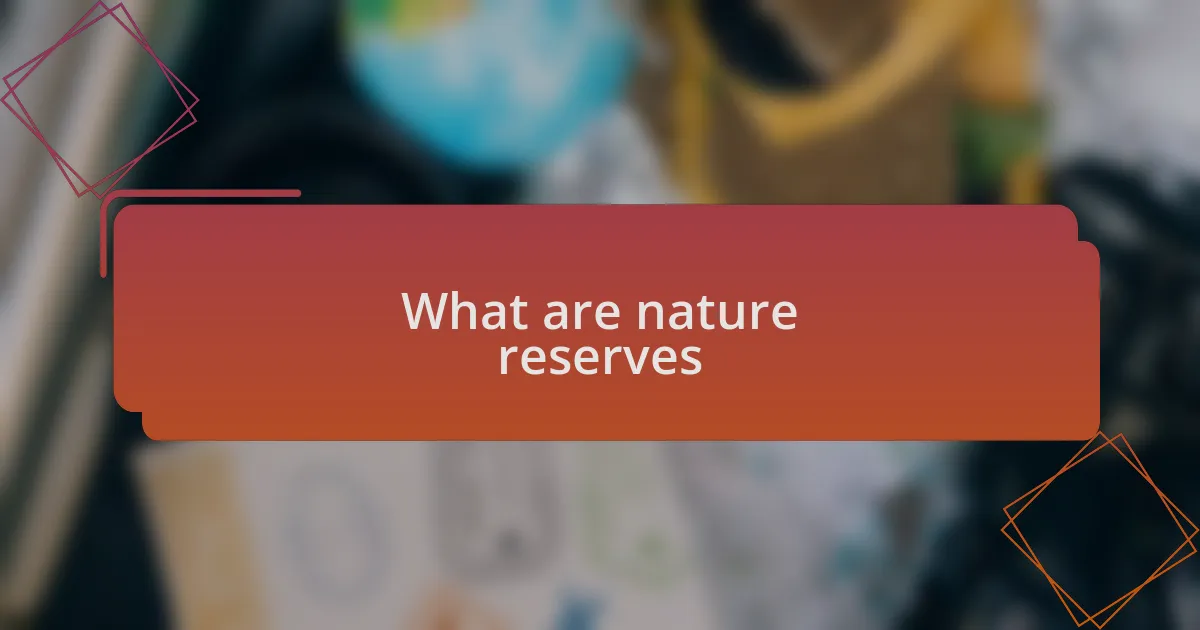
What are nature reserves
Nature reserves are protected areas specifically designated to conserve wildlife and their natural habitats. I remember wandering through one such reserve and feeling a profound connection to the earth as I observed the delicate balance of flora and fauna around me. Isn’t it fascinating how these spaces provide a sanctuary for species that might otherwise struggle to survive in urban settings?
These areas serve not only as a refuge for wildlife but also as vital ecosystems that sustain biodiversity. When I found myself surrounded by the chorus of chirping birds and rustling leaves, it struck me how nature reserves offer a glimpse into what our world could look like if we prioritized conservation. Do you ever wonder how many species we might lose without these crucial havens?
Moreover, nature reserves offer us an invaluable opportunity to learn about environmental stewardship. As I stood quietly by a serene pond, I couldn’t help but think about our responsibility to protect these spaces. How can we support the conservation efforts that allow not just the wildlife, but ourselves, to thrive in harmony with nature?
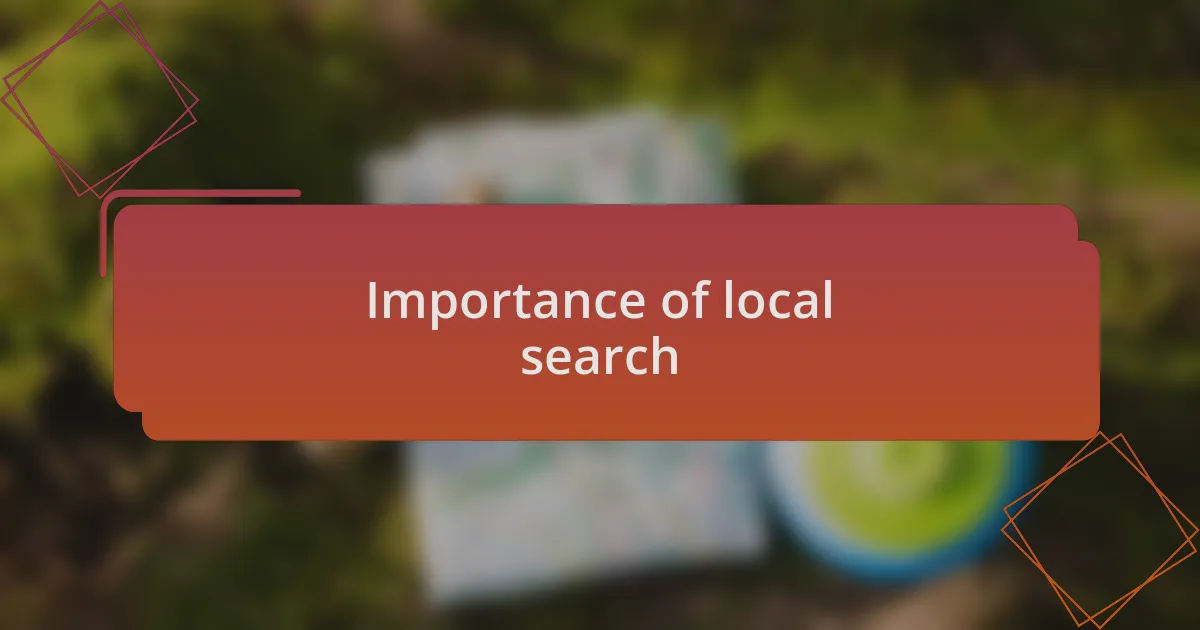
Importance of local search
Searching locally is crucial in our digital age, especially for finding services and experiences that matter most to us. I’ve often felt the frustration of sifting through broad search results that don’t address my particular needs. Imagine being able to easily discover that quaint café or hidden gem in your neighborhood simply because you searched for it locally. Isn’t it empowering to connect more directly with our community?
When I dive into local search, I find that it not only helps me locate nearby businesses but also fosters a sense of community. For example, after moving to a new town, I used local search to uncover nearby parks, shops, and services. Each successful discovery enriched my experience, allowing me to engage with my surroundings in ways that I hadn’t imagined. Have you ever taken a moment to consider how local businesses contribute to the uniqueness of your area?
Additionally, local search can enhance our travel experiences. During a recent trip, I turned to local search engines to discover less touristy attractions and dining spots frequented by locals. This approach transformed my visit from ordinary to extraordinary, making my experiences richer and more authentic. I can’t help but wonder how many hidden treasures are just waiting to be discovered by those who take the time to search locally.
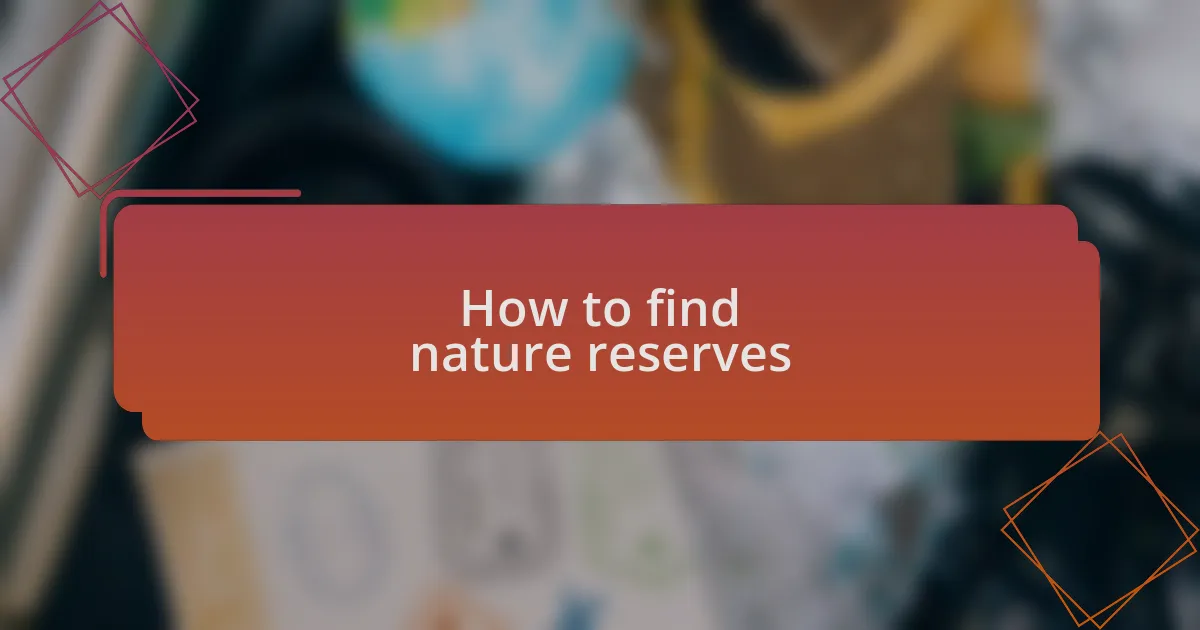
How to find nature reserves
Finding nature reserves often begins with a simple online search. I remember when I first wanted to explore them; I typed “nature reserves near me” into my search engine and quickly found a wealth of information. Websites dedicated to local attractions often provide detailed guides, which can lead to some spectacular finds that you might not stumble upon otherwise. Have you ever experienced that thrill of discovering a place you never knew existed?
Additionally, social media can be a treasure trove for uncovering nature reserves. I’ve seen stunning photos shared by friends or local wildlife organizations that piqued my interest. Platforms like Instagram and Facebook have communities dedicated to local exploration, where members share their favorite spots, including less-known nature reserves. You might be surprised at what’s lurking just beyond your usual haunts.
Another effective way is to simply ask locals or visit community centers. Engaging with people who live in the area can yield hidden gems that wouldn’t show up in a search. On one of my outings, I chatted with a park ranger who shared insights about a secluded reserve that wasn’t on any maps. Have you thought about the stories and recommendations that locals can offer? Those interactions often lead to the most memorable and enjoyable experiences in nature.
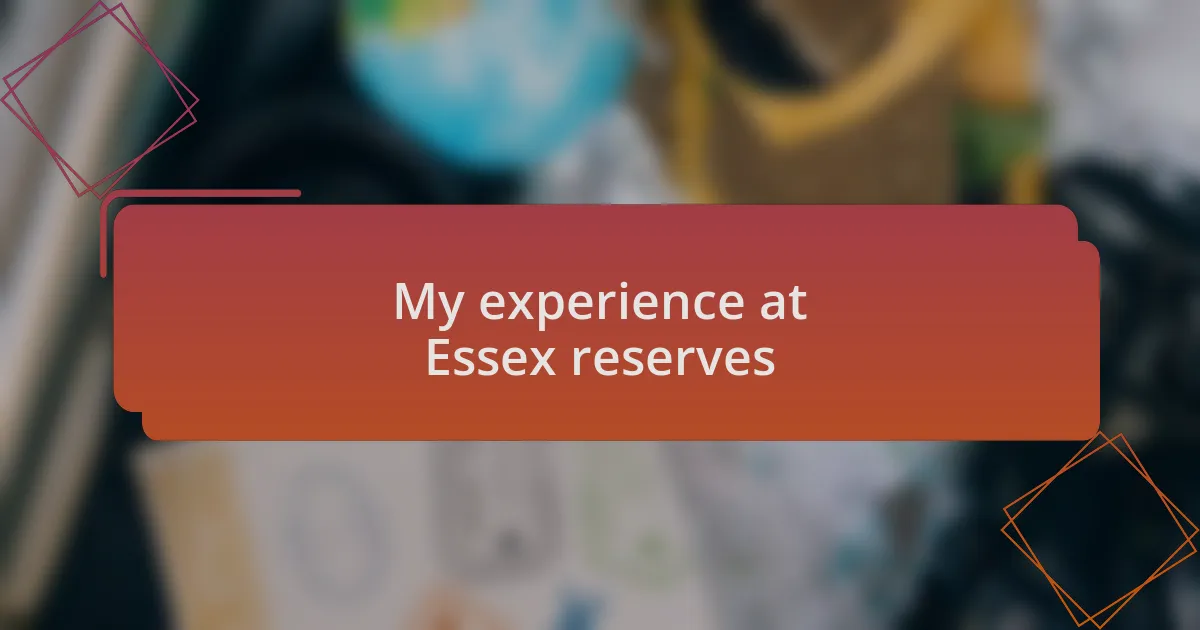
My experience at Essex reserves
Stepping into the Essex nature reserves was like entering a hidden world. I vividly recall the first time I wandered along the trails, enveloped by the rustling leaves and the sweet melodies of chirping birds. It felt like a breath of fresh air—both literally and metaphorically. Can nature really impact our mood this profoundly? I believe it can.
One particularly memorable afternoon, I sat on a bench overlooking a tranquil pond, watching the sunlight dance on the water. It struck me how peaceful those moments felt compared to the hustle and bustle of everyday life. It’s amazing how immersing oneself in such surroundings can shift your perspective. Have you ever found solace in nature? For me, it’s a reminder that the simplest things often bring the greatest joy.
On another visit, I ventured with a small group of fellow nature enthusiasts, united by our shared curiosity and love for the outdoors. As we explored the diverse habitats, I learned to identify different birdcalls and plant species, which enhanced my appreciation for the environment. The camaraderie we built felt invigorating, underscoring the idea that experiences are richer when shared. Isn’t it fascinating how nature not only nurtures us individually but also fosters connections among people?
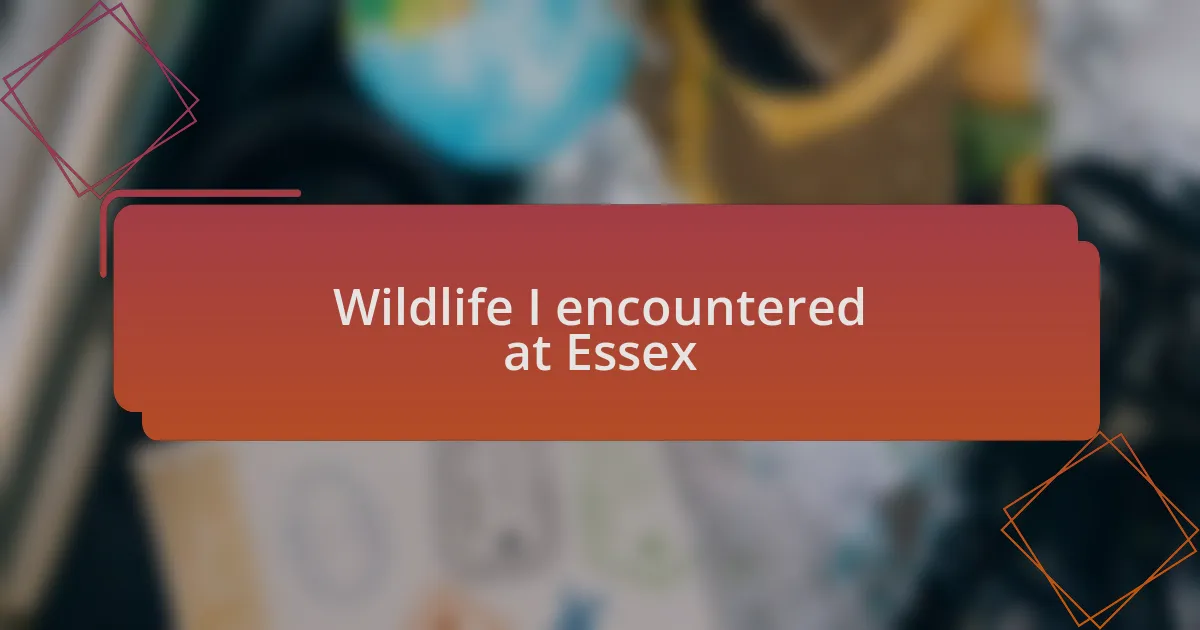
Wildlife I encountered at Essex
During my explorations at Essex, I encountered an astonishing variety of wildlife that truly opened my eyes to the richness of nature. One afternoon, while quietly observing a thicket, I spotted a pair of red foxes playfully interacting. Their agility and playful spirit reminded me that wildlife has its own way of expressing joy—an echo of our own. Have you ever paused to watch animals in their natural habitat? It’s a humbling experience that connects us back to our fundamental roots.
On another visit, I stumbled upon a local heron standing majestically at the water’s edge, perfectly still and seemingly lost in contemplation. I couldn’t help but feel a sense of awe as it stretched its wings, taking flight in a graceful arc across the sky. Moments like these make you wonder: how often do we overlook such beauty in our fast-paced lives? The heron become a symbol for me, representing the calm and focus we can find in nature.
While walking along one of the winding paths, I was fortunate enough to witness a family of deer grazing peacefully among the trees. The sight was so serene that I instinctively lowered my voice, as if not to disturb their tranquil world. I realized then that observing wildlife is not just about seeing; it’s about feeling a connection to every living creature around us. Isn’t it fascinating how these encounters remind us to be more present and appreciative of the world we share?
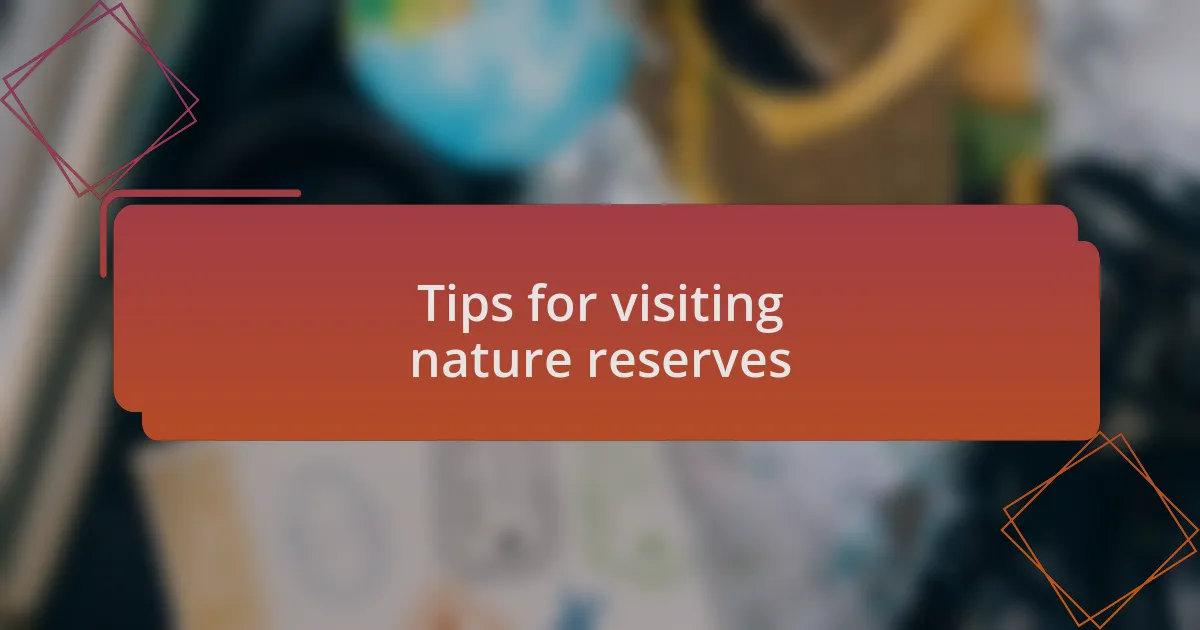
Tips for visiting nature reserves
When visiting nature reserves, I’ve learned to equip myself with the right gear. Comfortable shoes are a must for those winding trails, and I always pack a lightweight jacket, as weather can change unexpectedly. Have you ever trudged through mud in sneakers? It’s not a pleasant experience!
I also find that having a camera or a notebook handy adds to the adventure. Capturing those fleeting moments—like a butterfly landing on a flower or the gentle rustling of leaves—enriches the experience. When I review my photos later, it’s like stepping back into those beautiful moments. How often do we take the time to document our experiences in nature?
Another tip is to embrace the quiet. At one reserve, I learned the value of stillness while sitting on a bench, just listening to the sounds around me. The rustle of the wind and the distant calls of birds made me realize that nature has its own rhythm. This tranquility can be incredibly grounding, reminding us to slow down and appreciate the simplicity of being present in the moment. What small joys might we miss if we’re too busy rushing through our surroundings?
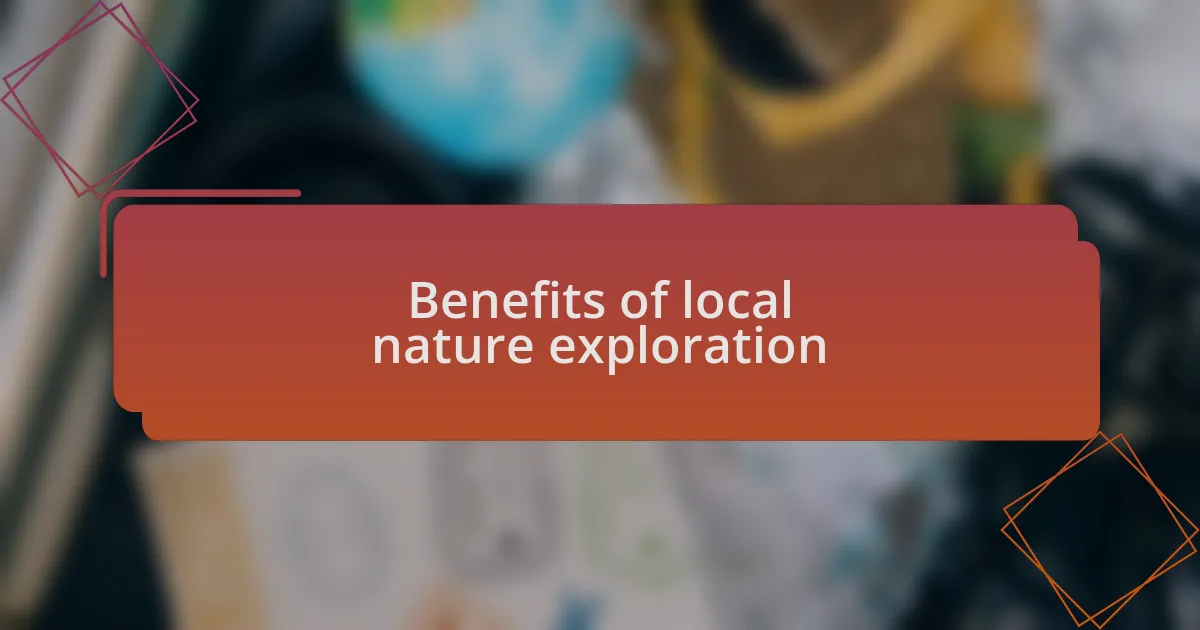
Benefits of local nature exploration
Exploring local nature reserves can significantly enhance our mental well-being. On one outing, after a particularly stressful week, I found solace among the trees. The simple act of walking along a forest path allowed my mind to clear; it was as if the rustling leaves and chirping birds were silent reassurance that everything would be okay. Have you ever noticed how nature seems to absorb our worries?
There’s also a profound connection that arises from engaging with local flora and fauna. During a visit to a nature reserve, I was captivated by a family of deer gracefully navigating their surroundings. In that moment, I felt a deep sense of gratitude for the wildlife we often overlook. It struck me that observing these animals in their natural habitat creates a bond that fosters respect for our environment. How often do we take a moment to appreciate the creatures we share our world with?
Additionally, local nature exploration can inspire a greater appreciation for conservation efforts. While hiking, I stumbled upon an informative sign detailing the ecosystem’s importance. I realized that understanding the delicate balance of nature makes me more passionate about protecting it. Isn’t it fascinating how an encounter with a single tree or flower can ignite a desire to make a difference in our surroundings?